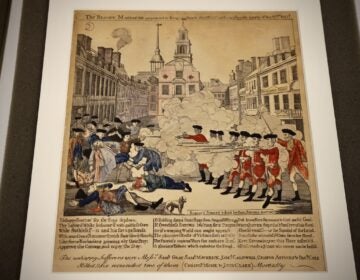Princeton University rejects protesters’ demands to remove Woodrow Wilson’s name

Robertson Hall is home to the Woodrow Wilson School of Public and International Affairs at Princeton University. (AP Photo/Mel Evans
The Princeton University Board of Trustees announced this morning that it will continue to honor Woodrow Wilson by keeping his name on its public policy school and a dormitory building.
In November, student protesters occupied the university president’s office and called on Princeton to drop Wilson’s name from The Woodrow Wilson School of Public and International Affairs and the residential hall Wilson College.
Members of the Black Justice League, among others, said Wilson was racist in his attitudes and his policies.
In a statement, the Black Justice League said it was not surprised by the decision, but its members were disappointed.
“With these actions and others Princeton continues to demonstrate its seemingly intractable investment in white supremacy and its vestiges,” the statement continued.
The Wilson Legacy Review Committee that was created following the protests acknowledges fully that Wilson was racist for his practice as a university president to prevent the enrollment of black students and the policies he instituted as U.S. president that resulted in again segregating the federal civil service.
Historians don’t dispute this characterization but point out this Wilson’s views need to be taken in consideration of a time when many Americans held similar views.
Wilson served as president of Princeton from 1902 to 1910 before becoming president of the United States from 1913 to 1921.
 The university report also calls for efforts to make the school more inclusive and present a more honest view of Woodrow Wilson.
The university report also calls for efforts to make the school more inclusive and present a more honest view of Woodrow Wilson.
The committee recommended and the board approved new initiatives in four areas:
* establish a new high-profile pipeline program to encourage more students from underrepresented groups to pursue doctoral degrees;
* encourage and support a broad range of education and transparency initiatives to create a more multifaceted understanding and representation of Wilson on campus and to focus attention on aspects of Princeton’s history that have been forgotten, overlooked, subordinated, or suppressed;
* diversify campus art and iconography to reflect the diversity and inclusivity of today’s Princeton;
* and change Princeton’s informal motto from “Princeton in the nation’s service and the service of all nations” to “Princeton in the nation’s service and the service of humanity.”
WHYY is your source for fact-based, in-depth journalism and information. As a nonprofit organization, we rely on financial support from readers like you. Please give today.




